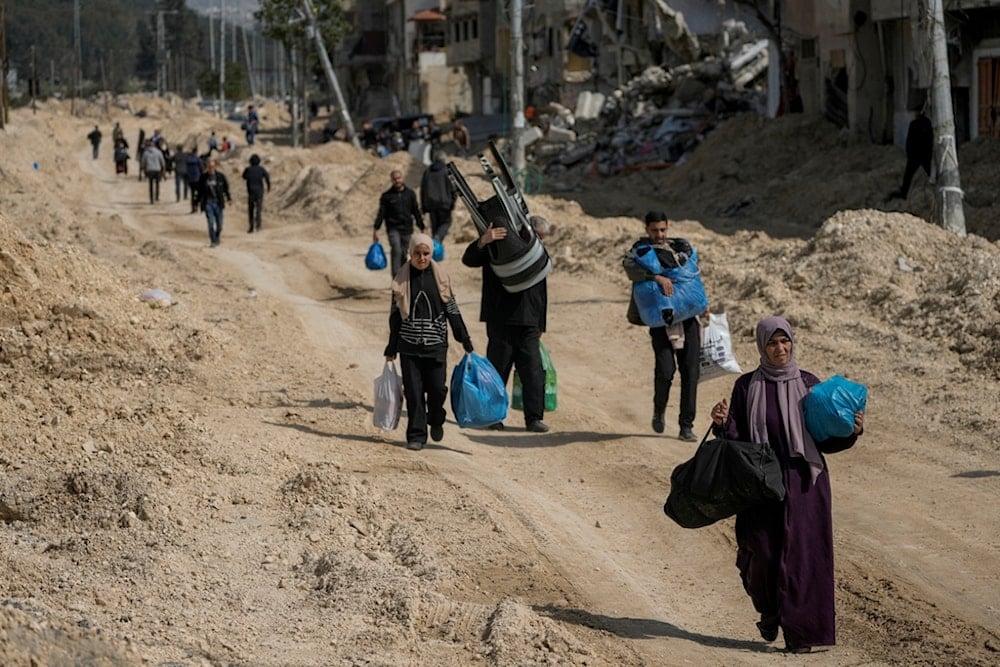Humanitarian aid crisis hits West Bank amid Israeli restrictions: WaPo
"Israel’s" military aggression in Jenin and Tulkarm has displaced more than 40,000 people, demolished hundreds of homes, and left aid groups struggling to provide relief.
-
 Residents of the West Bank urban refugee camp of Nur Shams evacuate their homes and carry their belongings as the Israeli military continues its operation in the area, on Wednesday, March 5, 2025 (AP)
Residents of the West Bank urban refugee camp of Nur Shams evacuate their homes and carry their belongings as the Israeli military continues its operation in the area, on Wednesday, March 5, 2025 (AP)
A prolonged Israeli aggression has forcibly displaced tens of thousands of Palestinians in the northern occupied West Bank, with local authorities warning that the crisis shows no signs of easing as humanitarian organizations, hindered by Israeli restrictions and funding shortages, struggle to provide assistance, The Washington Post reported.
"Israel" unleashed its war machine on the West Bank in January, deploying troops, tanks, and armored bulldozers under the pretext of "combating terrorism". The offensive began in the Jenin refugee camp, where Israeli forces tore up roads, demolished homes, and barred residents from returning.
Largest displacement since 1967 occupation
According to the United Nations, the operation has forcibly displaced over 40,000 people from refugee camps and surrounding communities in Jenin and Tulkarm. Israeli occupation forces have since demolished or inflicted severe damage on hundreds of homes and residential buildings, as reported by the UN, local authorities, video footage, and eyewitness testimonies.
The scale of displacement is unprecedented since "Israel’s" occupation of the West Bank began in 1967, highlighted Roland Friedrich, director of the UN Relief and Works Agency for Palestinian Refugees (UNRWA) in the region.
He noted that roughly one-third of Palestinians in the West Bank—around 900,000 people—are officially registered as refugees, their families having fled or been displaced from their homes during the 1948 war that led to the establishment of the Israeli occupation entity.
The report mentioned that local authorities, supported by donors and international organizations, have placed thousands of the most vulnerable residents in temporary shelters and provided emergency aid. However, Israeli-imposed restrictions, ongoing security risks, and funding shortages are severely limiting their ability to deliver humanitarian assistance. Financial support for shelters is also running dangerously low.
“This is considered an abnormal crisis,” indicated Mohammad Sabbagh, head of the Popular Services Committee in Jenin camp. “This is a new catastrophe for Jenin camp.”
In separate incidents, two women were shot in the legs while attempting to enter the camp, according to Mahmoud al-Saadi, director of the Palestine Red Crescent Society in Jenin.
Palestinian authorities overwhelmed
The Post noted that many displaced residents have avoided taking the risk of returning. Instead, they are surviving on aid, primarily provided by local institutions and donors. The Jenin camp, one of the West Bank’s poorest areas, already suffered from high unemployment and widespread poverty before the latest escalation, according to local officials.
Meanwhile, municipalities and the Palestinian Authority in Ramallah face severe financial constraints that leave them ill-equipped to handle the emergency.
“What’s happening now, it’s beyond our capabilities,” expressed Jenin Mayor Mohammad Jarrar.
The Popular Services Committee and the US-based nonprofit World Central Kitchen distribute approximately 9,000 meals daily, according to Sabbagh. However, this only reaches less than half of those displaced, who are scattered throughout Jenin and its surrounding rural areas.
With funds raised from civil society and its emergency budget, the committee has rented vacant dormitories at the nearby Arab American University to shelter 450 of the most vulnerable families, at a cost of up to $40,000 per month, the report mentioned.
However, the university shelter is now at full capacity, and financial resources are dwindling. Donations from local business leaders will cover dormitory rent for some families until June, but for others, funding could run out within days, Jarrar said. Families currently housed at a center for the blind will soon be forced to leave, he added.
Without urgent intervention, Sabbagh fears, “maybe those people will end up in the streets.”
UNRWA struggles amid Israeli restrictions
UNRWA, which has provided aid to Palestinian refugees since its establishment in 1949, is usually the primary humanitarian responder for displaced Palestinians. The agency has issued emergency cash assistance to thousands of affected families, set up psychological support hotlines, and opened mobile clinics and emergency health centers for those previously dependent on UNRWA’s services in the camps.
However, new Israeli laws are increasingly obstructing its operations. One law prohibits Israeli officials from communicating with UNRWA staff, making it difficult to engage with the military when soldiers raid the agency’s facilities in the West Bank, Friedrich explained. Additionally, UNRWA personnel have faced harassment by Israeli soldiers at checkpoints.
Beyond financial constraints, humanitarian organizations must navigate severe access restrictions due to a growing number of Israeli checkpoints and roadblocks, confrontations with soldiers and settlers, and safety concerns related to military operations that have damaged humanitarian infrastructure, according to aid workers and a February report from a coalition of NGOs.
Since the aggression began, Israeli forces have demolished 200 residential buildings in the Jenin refugee camp, according to Israeli newspaper Yedioth Ahronoth, which cited security sources.
This month, Israeli authorities issued demolition orders for approximately 90 additional buildings, a move Jarrar warned would leave 300 more families homeless. It is noteworthy that Israeli Security Minister Yoav Gallant stated in February that Israeli troops may remain in the refugee camps for up to a year.
Read more: MSF warns of dire conditions for displaced Palestinians in West Bank

 5 Min Read
5 Min Read









